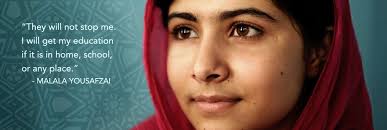
Malala Yousafzai is the youngest Nobel Peace Prize laureate in history.
From a young age, Yousafzai made a name for herself in her community as someone who was unafraid to criticize the Taliban. She has been especially critical of terrorist attempts to prevent young girls from getting an education in Pakistan and elsewhere.
During her Nobel speech, she commented on her attempted assassination at the hands of a Taliban gunman in 2012. She was just 14 years old when the gunman boarded her bus, pointed a pistol at her head, and pulled the trigger in an attempt to silence her.
"I had two options — one was to remain silent and wait to be killed," Yousafzai said. "And the second was to speak up and then be killed. I chose the second one. I decided to speak up."
Yousafzai made a full recovery after the shooting.
Her attitude toward the threat of being shot and killed is astounding considering her young age.
"The terrorists tried to stop us," she said. "Neither their ideas nor their bullets could win. We survived. And since that day, our voices have grown louder and louder."
Yousafzai also called attention to her friends in the audience, noting that her story is not all that uncommon.
"I tell my story not because it is unique but because it is not," she said. "It is the story of many girls. Today, I tell their stories too. I have brought with me some of my sisters from Pakistan, from Nigeria, and from Syria who share this story.”